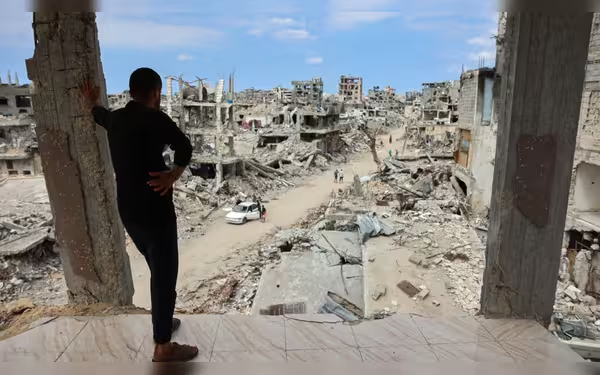Saturday, November 16, 2024 05:31 PM
Gaza's Year of Suffering: A Community in Despair
- Gaza residents face unimaginable hardships and displacement.
- Over 90% of the population has been displaced at least once.
- The humanitarian crisis in Gaza has reached alarming levels.
 Image Credits: arabnewspk
Image Credits: arabnewspkOne year after the Hamas attack, Gaza faces dire humanitarian crises and overwhelming suffering among its residents.
One year has passed since the devastating attack by Hamas on Israel, which ignited a brutal conflict in the Gaza Strip. The situation in this Palestinian territory has become increasingly dire, with residents facing unimaginable hardships. Displacement, shortages of essential supplies, and constant fear have left the people of Gaza exhausted and desperate for relief.
Khaled Al-Hawajri, a 46-year-old resident, expressed the overwhelming sense of dread that has gripped his community. He stated, "It felt like the first day of the war all over again," as Israeli forces continued their bombardment of his neighborhood. Al-Hawajri, who has been displaced ten times with his family of seven, lamented, "We have endured a whole year in the north under bombardment, terror, and fear in the hearts of my children." His words reflect the grim reality faced by many in Gaza, where safety seems like a distant memory.
The landscape of Gaza City has changed dramatically, with air strikes and fighting leaving it barely recognizable. Streets are covered in sand, buildings stand in ruins, and the once-bustling city is now a shell of its former self. Residents navigate through piles of rubble, as the lack of fuel has rendered car traffic nearly nonexistent. Hussam Mansour, a 64-year-old man, shared his despair, saying, "There is no electricity or petroleum products. Even firewood is not available. Food is almost non-existent." His apartment building was destroyed in an air strike, and he, along with his sons, has been displaced.
The United Nations reports that a staggering 92 percent of Gaza’s roads and over 84 percent of its health facilities have been damaged or destroyed due to the ongoing conflict. The humanitarian crisis has reached alarming levels, with approximately 90 percent of the population having been displaced at least once. Muhammad Al-Muqayyid, another resident, described the recent nights as some of the hardest, stating, "Last night was one of the hardest nights of the war, as if the war had just begun!" He reflected on the prolonged suffering, saying, "A year has gone and we have seen every kind of suffering — disease, hunger, danger, and loss."
The Israeli military has been engaged in a relentless campaign against Hamas since the initial attack, which resulted in the deaths of 1,205 people, primarily civilians. In retaliation, Israel's military offensive has claimed the lives of at least 41,909 individuals in Gaza, with the majority being civilians, according to the Hamas-run health ministry. The United Nations has acknowledged these figures as reliable, underscoring the tragic toll of the conflict.
Despite the ongoing military operations, Israel has yet to achieve one of its primary objectives: the return of hostages taken on October 7, 2023. Out of the 251 individuals captured, 97 remain in captivity, with 34 confirmed dead. The Israeli military continues its efforts to free the hostages while attempting to dismantle Hamas, which has held power since 2007.
As the conflict rages on, the people of Gaza remain caught in a cycle of violence and despair. Samah Ali, a 32-year-old woman displaced in Deir el-Balah, noted the predictability of rocket launches on such anniversaries, stating, "It’s certain that the occupation army will return and strike." The fear of retaliatory strikes looms large, as families are forced to flee their homes in search of safety.
The anniversary of the October 7 attack serves as a painful reminder of the ongoing suffering in Gaza. The resilience of its people is commendable, yet the need for humanitarian assistance and a resolution to the conflict has never been more urgent. As the world watches, it is crucial to advocate for peace and support those who have endured a year of unimaginable hardship. The hope for a brighter future remains, but it is contingent upon the commitment of all parties involved to seek a lasting solution.













